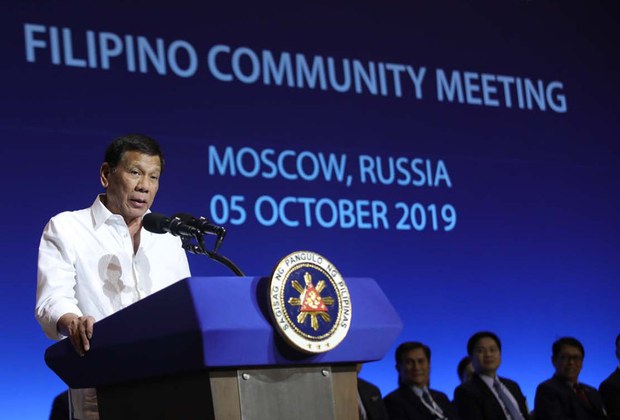Government Plays Down Philippine Leader’s Admission of Sickness
2019.10.07
Manila
 Philippine President Rodrigo Duterte delivers a speech to the Filipino community in Moscow, Oct. 5, 2019.
Philippine President Rodrigo Duterte delivers a speech to the Filipino community in Moscow, Oct. 5, 2019.
Updated at 2:18 p.m. ET on 2019-10-07
The Philippine government on Monday downplayed President Rodrigo Duterte’s own admission that he suffers from a neuromuscular disease, and emphasized that the affliction has not slowed him.
As he wound down a visit to Russia, Duterte told the Filipino community in Moscow on Saturday that he had myasthenia gravis, an illness that contributes to skeletal muscle weakness.
“This is an ordinary condition afflicting the elderly,” presidential spokesman Salvador Panelo told ANC, a Philippine television news channel. “I’m even amazed how he was able to survive this Russian trip.”
Sen. Christopher “Bong” Go, the president’s former special assistant, told reporters Duterte had a “localized ocular myasthenia,” which has not progressed. “Nothing serious,” he said.
The 74-year-old Duterte mentioned the ailment while in Russia after he couldn’t look straight at a woman with whom he had danced a duet earlier.
“I have a talent. When I look at you, my other eye droops. Do you see? The other eye is smaller. It goes where it wants,” Duterte said, according to an official transcript emailed to reporters by the presidential palace in Manila.
“Actually, that’s myasthenia gravis. It’s a nerve malfunction,” he said, adding that the disease runs in the Duterte family because his grandfather also had it.
Myasthenia gravis, which comes from Greek and Latin words meaning “grave muscular weakness” has no cure and can be treated with medicine or surgery to help relieve symptoms, according to WebMD.com. It often affects the muscles that control the eyelids and facial expression, and could cause difficulties with swallowing and breathing.
Duterte and members of his delegation returned home Sunday, but he never mentioned the disease. But he complained that he was “nursing a very bad case of the cold” and said he wasn’t able to sleep during the 13-hour flight from Moscow. He delivered a brief arrival statement, but stayed for a while to answer some questions.
The president is known for his long-winded speeches, during which he often rails about the west, grumbles about corruption and threatens drug peddlers he would kill them.
About five months ago, Duterte suddenly dropped out of public view for a week, sparking a media frenzy about the state of his health. The government later released a picture of the president lazily enjoying breakfast with his chief aide.
Last year, he told the public that he had undergone colonoscopy, and said his doctors told him that he had Barret’s esophagus, a condition marked by an abnormality in the lining of the lower esophagus. Duterte also has Buerger’s disease, which leads to pain caused by constriction of blood vessels in the arms and legs.
The Philippine Constitution stipulates that “in case of a serious illness of the President, the public shall be informed,” but Duterte himself had in the past brushed aside his health issues as a normal consequence of aging.







